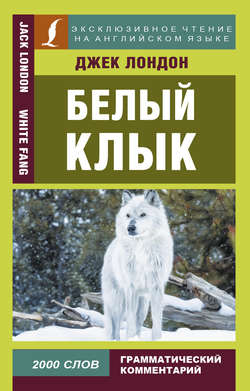Читать книгу Белый Клык / White Fang - Джек Лондон, William Hootkins - Страница 7
White Fang
by Jack London
Part II
Chapter III. THE GREY CUB
ОглавлениеHe was different from his brothers and sisters. Their hair already betrayed the reddish hue inherited from their mother; while he alone took after his father[20]. He was the only grey cub of the litter. He was a real wolf—in fact, he was like One Eye himself.
The grey cub’s eyes had not been open long, yet already he could see clearly. And while his eyes were still closed, he had felt, tasted, and smelled. He knew his two brothers and his two sisters very well. And long before his eyes had opened he had learned by touch, taste, and smell to know his mother. She had a soft, caressing tongue that calmed him when it passed over his soft little body, and that made him sleepy.
Always, in the beginning, before his conscious life began, he had crawled toward the mouth of the cave. And his brothers and sisters did the same. The chemistry of the life that created them demanded the light.
Later the grey cub discovered that his mother also had a nose and a paw and could push and hit. Thus he learned hurt; and he learned to avoid hurt, first, by not risking; and second, when he had risked, by retreating. These were conscious actions, and were the results of his first generalizations upon the world.
He was a fierce little cub. So were his brothers and sisters. It was to be expected. He was a carnivorous animal and came of a breed of meat-killers and meat-eaters. His father and mother lived wholly upon meat. The milk he drank was transformed directly from meat.
But he was the fiercest of the litter. He could make a louder growl than any of them, and it was he who first learned many things. He was always going to the mouth of the cave—and was always stopped by his mother. To him the entrance of the cave was a wall—a wall of light; it attracted him as a candle attracts a moth. The life that was within him knew that it was the one way out, the way he must choose.
Though never allowed by his mother to approach that wall, he had approached the other walls, and felt a hard obstacle on the end of his tender nose. This hurt. And after several such adventures, he left the walls alone.
In fact, the grey cub did not think—at least, not like men. Yet his conclusions were as sharp as those of men. He had a method of accepting things, without questioning ‘why’. In reality, this was the act of classification. He never asked why a thing happened. How it happened was enough for him. Thus, when he had touched back-wall a few times with his nose, he accepted that he would not disappear into walls. In the same way he accepted that his father could disappear into the wall of light. Logic and physics were no part of his mental make-up.
Like most creatures of the Wild, he early experienced hunger. Hunger came unexpectedly. At first, the cubs cried, but for the most part they slept. It was not long before they were in a coma of hunger. The cubs slept, while the life that was in them was dying down.
One Eye was desperate. He ranged far and wide, and slept but little. The she-wolf, too, left her litter and went out in search of meat.
When the grey cub came back to life and again took interest in the far white wall, he found that only one sister remained to him. The rest were gone. And soon she was gone, too.
Then there came a time when the grey cub no longer saw his father appearing and disappearing in the wall or lying down asleep in the entrance. The she-wolf knew why One Eye never came back, but there was no way by which she could tell what she had seen to the grey cub. Hunting herself for meat, she had followed a day-old trail of One Eye. And she had found him, or what remained of him. There were many signs of the battle, and of the lynx that came back to her lair after having won the victory. The she-wolf found this lair, but the signs told her that the lynx was inside, and she did not dare to come in.
After that, the she-wolf avoided hunting there. She knew that in the lynx’s lair there was a litter of kittens. It was quite a different matter for a lone wolf to fight a lynx—especially when the lynx had a litter of hungry kittens.
But the Wild is the Wild, and motherhood is motherhood, and the time was to come when the she-wolf, for her grey cub’s sake[21], would dare to go there.
20
take after smb. – быть на кого-л. похожим
21
for smb’s sake – ради кого-либо
